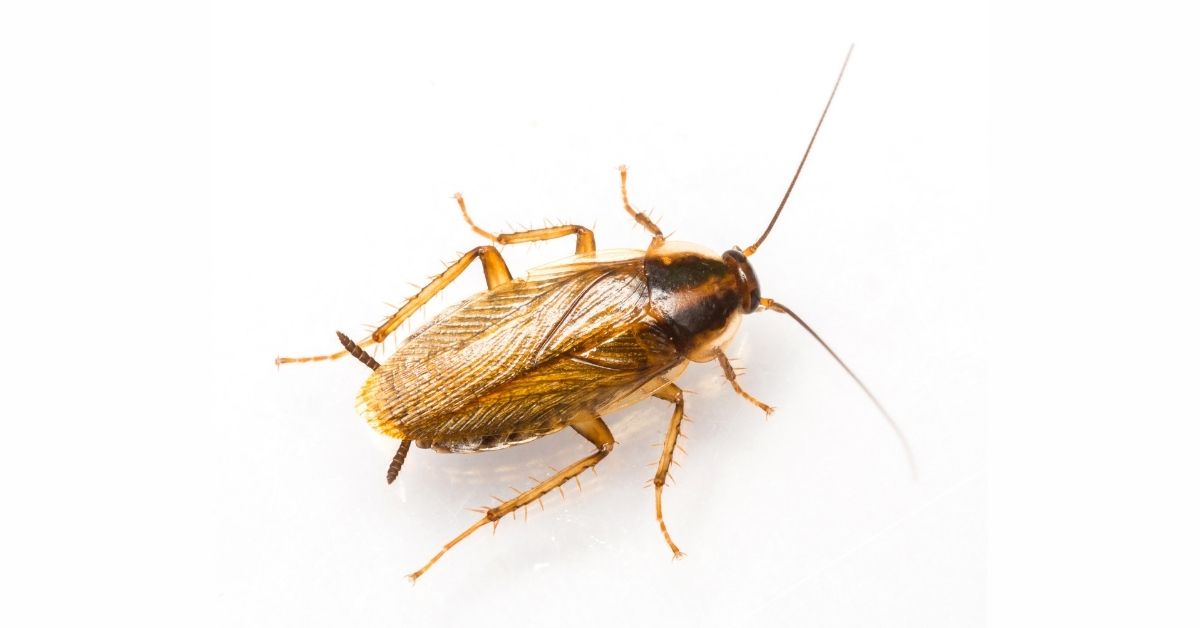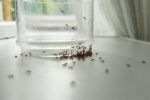
How to Get Rid of German Cockroaches
The sight of a German cockroach in your kitchen can induce panic and send you on a frantic internet search for “how to get rid of German cockroaches.” These unsanitary pests can infest your home and quickly take over. When roaches move in, their presence is unsettling, but they can also pose a potential hazard to your health by spreading illness. These bugs will help themselves to your food supply and may leave unsanitary bacteria behind as they feed. They can even affect and spoil the air quality and surfaces in your home with their shed skins and fecal material.
Sometimes people feel embarrassed when they have a cockroach infestation. They assume that only dirty homes get cockroaches, but roaches can infest even the cleanest homes. With the proper treatment, it is possible to eliminate these unwanted guests from your home.
What Do German Cockroaches Look Like?
The first step to addressing any pest problem is to identify the bug correctly. German cockroaches are smaller than other species of roaches, and they are the most common roach in the country within homes, so if you have smaller cockroaches in your home, there is a good chance they are German cockroaches. Look for these other features to confirm the presence of German cockroaches in your home:
- About half an inch in length
- Light brown and yellowish bodies for the adults
- Six legs with spines
- Two dark, vertical stripes behind their heads
- Winged but flightless
- Rapid reproduction
- Nymphs look like adults but are smaller, darker, and wingless
Female cockroaches can lay up to seven egg cases, called ootheca, with 40 eggs each during their short lifetime. That means that, without adequate pest control, a single female cockroach in your home can potentially hatch over 280 cockroaches. In ideal conditions, a female can produce almost 400 eggs. If small roaches are rapidly multiplying in your home, you probably have a German cockroach infestation.
This insect is commonly confused with the Asian cockroach. You can distinguish between the two by the Asian cockroach’s ability to fly and its attraction to light. Luckily, the Asian cockroach does not normally invade homes. But the same cannot be said about the German cockroach, which almost exclusively infests homes, gaining entry through shared walls, luggage, clothing, packages, or other goods that are brought into the home where German cockroaches can be hiding and waiting to invade.
How Long Do German Cockroaches Live?
These bugs live relatively short lives, about 100 to 200 days, and sometimes up to a year, but diet, temperature, and injuries can impact their lifespan. These pests have three life phases: egg, nymph, and adult. If you have an infestation in your home, the population probably contains about 75 percent nymphs, 25 percent adult roaches, with the females’ having a great capacity to lay many eggs. Nymphs can develop into adults within 100 days under the right conditions.
What Do German Cockroaches Eat?
These roaches are scavengers, and as such, they will eat almost anything. Garbage and food remnants is a primary food source for German cockroaches. They share the food preferences of many other bugs (and humans), going for sweets, grease, starches, and meat. You do not need to leave out large servings of food to attract roaches. They are attracted to even trace amounts of these foods on your kitchen surfaces and in your cabinets and pantry. Unless you secure a food item in a clean, airtight container, it will attract these insects.
Without other sources of food, these pests will eat anything. Roaches have been observed eating pet food, hair, glue, and excrement. These bugs are not discerning with what they eat, which is why more pest control measures are necessary than simply limiting their access to food sources to get rid of an infestation.
What Attracts German Cockroaches to a Home?
For living spaces, German cockroaches look for the same things as many other living organisms: shelter, abundant food options, and a water source. Food items are the biggest attraction for these pests, but water and moisture are also culprits. Any of the following will attract German cockroaches:
- Dishes left in the sink overnight
- Food or drink smears and spills on your kitchen surfaces and in your pantry or cabinet
- Food crumbs on floors, counters, or tables
- Bowls of pet food on the floor
- Food items with thin packaging
- Poorly sealed stored food
- Garbage
- Cardboard boxes
- Clutter which gives them shelter and places to hide
- Leaving food out on the counter
- Leaky faucets or tubs
- Leaking toilets or other appliances
- Moist basements
As you can see from this list of the wide range of things that attract roaches, your home does not necessarily have to be dirty for them to move in.
Where Can I Find Roaches in My Home?
Within your home, certain spaces are more attractive to roaches. They like dark, quiet areas, so look for the pests in these common hiding spots:
- In cracks and crevices
- Around wiring and electronics
- Under sinks
- In walls
- In ceiling pipes
- Under appliances like stoves, dishwashers, and refrigerators
- In basements
- In crawl spaces
- Between baseboards
- In hinges in doors and cabinetry
- In door and bed frames
Knowing where the roaches are hanging out may help you better understand how they access your home and more effectively target and eliminate them.
How Do German Cockroaches Get in Your House?
When you see these insects in your home, you may wonder how they even got there in the first place. Perhaps you keep a tidy house and are puzzled about why they decided to move in. German roaches typically only live within structures. So to invade, they can gain access to homes by hiding or “hitchhiking” in goods that are brought into the home, such as furniture, luggage, clothing, etc. The pests can also hide in the bags and boxes you bring into your living space. If you live in an apartment, condo, or townhome, cockroaches can move between neighboring walls through the plumbing within a shared wall or via utility lines. Once these cockroaches gain access to your homes, they can begin to infest and reproduce if they are able to find shelter, food, or water. Unfortunately, they are skilled at finding food, and it doesn’t take much to support an infestation.
How Concerning Are German Cockroaches?
These small insects are more hazardous than they might seem. They do not bite or sting, but they leave behind particles, bacteria, and shed skins that can make you sick, which is potentially more dangerous to health than an insect bite.
We have already discussed some of the more disgusting roach behaviors, from digging around in garbage to eating excrement. As you might expect, German cockroaches can pick up disease-causing bacteria as they forage for things to eat, and they can transfer these germs to the surfaces where you prepare food and live, potentially causing illness.
Even if these insects do not introduce dangerous germs into your home, they can leave behind particles that are detrimental to your home’s air quality, which is a significant concern if anyone in your home has asthma or allergies. The allergens cockroaches produce are most abundant in their feces and the body part fragments from dead roaches, and when these allergens become airborne, they diminish your air quality. These airborne particles eventually settle on surfaces where we eat, sleep, and breathe, potentially triggering asthma attacks and allergies. In fact, evidence shows that early exposure to roach allergens can cause young children to develop asthma.
As you can see, a German cockroach infestation is cause for concern and poses a threat to the health and safety of your home.
How Do You Prevent a German Cockroach Infestation?
Preventing cockroaches requires you to limit their access to food and moisture within your home. Sanitation is key. Follow these tips to prevent a roach infestation:
- Store any food items in your pantry and cabinets or on your counters in sealed, airtight containers
- Wipe down counters frequently
- Sweep floors
- Remove clutter
- Get rid of unused items
- Do not leave dirty dishes in the sink overnight
- Limit food prep and eating to one space to eliminate the areas that require cleaning
- Perform necessary maintenance on appliances to stop leaks
- Wipe down sinks and tubs to remove excess water
Preventing cockroach infestations requires a lot of effort, and if you live with other people, you will need to get everyone in your household on board with following these tips. Remember that following these recommendations alone will not eliminate an existing cockroach infestation, although they can be helpful when they are part of other pest control measures.
How to Get Rid of German Cockroaches
Sanitation is key. If you currently have a cockroach infestation, you can follow the above tips for preventing cockroaches as well as the ones listed below:
- Throw away corrugated boxes, a favorite breeding ground for roaches.
- Seal openings around doors and windows.
- Seal holes in shared walls with other apartments.
- Seal holes openings around sewer vents and drainage lines.
- Use a vacuum with a HEPA filter to remove cockroaches and immediately take the bag outside.
- Wipe clean food debris and spillage on the kitchen counters and behind appliances
As you can see, ridding your home of roaches is not a one-and-done endeavor. It is a complex and ongoing process that requires a lot of vigilance. Not everyone may feel up to addressing the problem without professional help.
Homeowners often go wrong with DIY pest control when they attempt to identify a bug on their own. Misidentifying the pest can mean that you apply the wrong treatments and strategies. Even if you correctly identify the bug, the recommended treatments you find on the internet are not customized for your home and living situation. Because you are applying a generic strategy to the problem, you may not adequately address it. Additionally, the treatments are only effective if applied correctly, so it may be best to leave the application of these products to the professionals.
Do You Need Professional Pest Control to Get Rid of German Cockroaches?
Most people find tackling a roach problem on their own too overwhelming and do not get the results they want. Ineffective pest control measures can worsen the situation and cause you to lose precious time as the infestation grows.
Professional pest control from an experienced technician is best. A technician can quickly identify the root cause of the infestation and work with you to develop a strategy for eliminating the roaches customized for your home and your family’s needs. Pest control professionals know how to make your home less desirable to these troublesome bugs, and they have access to tools and resources that are only available to trained professionals.
At Hulett, we are German cockroach experts. We educate and train our staff on the latest products, proper usage and handling, and the best solutions to rid your home of German cockroaches. We know that pest control can be an urgent matter. We are also open on Saturdays for your convenience. If you need an exterminator anywhere in South Florida, Hulett can help. When you have a German cockroach infestation in your home, act right away and Just Call Hulett for a free inspection.



